

Responsen sätter spår i hjärnan. Det utvecklande tankesättet har visat sig vara positivt för barns motivation och hur de hanterar misstag.
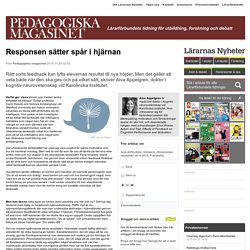
Men vad är det då som får oss att tänka på det ena eller andra viset och hur skapar vi ett utvecklande tankesätt? Flera forskare, bland andra Elizabeth Gunderson, har genom åren undersökt vilken feedback föräldrar ger till sina barn och konstaterar att deras sätt att ge beröm troligen påverkar vilket tankesätt barnen utvecklar senare i livet. Gunderson jämför effekten av beröm som handlar om barnets personlighet, som ”Du är så smart och duktig”, med beröm om vad och hur barnet gjort något, som ”Vad bra att du har plockat ihop alla klossar”.
Det visar sig att barn som får mer beröm kring sin process senare i livet verkar utveckla ett mer utvecklande tankesätt, medan barn som får beröm kring sin karaktär utvecklar ett låst tankesätt. Men kan dessa olika typer av beröm även påverka oss här och nu? Det var mycket spännande att se resultaten. Developing a growth mindset in the classroom. This article first appeared in Sec Ed magazine in April 2014.
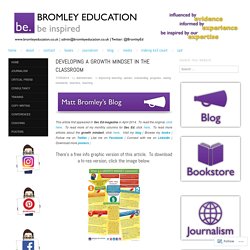
To read the original, click here. To read more of my monthly columns for Sec Ed, click here. To read more articles about the growth mindset, click here. Visit my blog | Browse my books | Follow me on Twitter | Like me on Facebook | Connect with me on LinkedIn | Download more posters | There’s a free info graphic version of this article. 6 ways to teach growth mindset from day one of school. Imagine if your new class this fall was full of students who would: Be willing to try new thingsStick with hard tasks and not give upPush themselves to do their best work, not just what’s “good enough”Believe in themselves and their own ability to learn Here’s the great news–these are traits that we can help develop in our students by teaching them about how their brains work.

Many students enter our classrooms believing they’re either smart or not smart, good at reading or math, or not good in those areas. Growth Mindset Video. Professor Carol Dweck 'Teaching a growth mindset' at Young Minds 2013. Carol Dweck: "The Growth Mindset". Carol Dweck. BBC Radio 4 - Mind Changers, Carol Dweck and Growth Mindset.
Growth Mindset Maths - Growth Mindset Maths. Becoming a growth mindset school. The idea of becoming a growth mindset school has been over a year in the making.
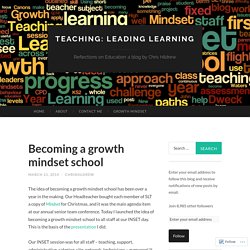
Our Headteacher bought each member of SLT a copy of Mindset for Christmas, and it was the main agenda item at our annual senior team conference. Today I launched the idea of becoming a growth mindset school to all staff at our INSET day. This is the basis of the presentation I did. Our INSET session was for all staff – teaching, support, administrative, catering, site, network, technicians – everyone!
It was essential for us, if we’re going to begin the process of shifting the culture of the school, that all staff are working together as one coherent team. Egna lärarreflektioner kring statiskt och dynamiskt tankesätt efter läsningen av Dwecks Mindset. File_download. File_download. File_download. Jlsu. Som en uppföljning till mitt förra blogginlägg om dynamiskt och statiskt tankesätt kommer här den s k isbergsillusionen.

Isbergsillusionen visar exempel på vad som krävs för att bli framgångsrik, men som oftast inte syns på ytan. När man ser någon som är riktigt duktig (t ex en idrottsutövare, en musiker, en jonglerare etc) ser det väldigt enkelt ut. Därför är det lätt att tro att det handlar om ”medfödd talang”. Det man dock inte ser är all den träning, den uppoffring och det hårda arbete som ligger bakom. Oftast är det de som tränar mest (och bäst) som når längst. Jlsu. En av böckerna som jag tipsade om i mitt blogginlägg boktips 2015 handlar om hur vi ser på hjärnan och vår förmåga att utvecklas.
Boken jag tänker på är Carol S. Growth Mindset Video Gallery - Mindset Works®: Student Motivation through a Growth Mindset, by Carol Dweck, Ph.D. MindsetPresentation. Pdf Carol Dweck Mindset Presentation January 20 2015. Growth Mindset Video. 212° the extra degree® Video (2014 Edition) - BEST MOTIVATIONAL VIDEO. Posters_growth_mindset.pptx. Developing a growth mindset in the classroom. There’s a free info graphic version of this article.
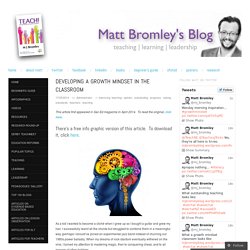
To download it, click here. As a kid I wanted to become a cliché when I grew up so I bought a guitar and grew my hair. I successfully learnt all the chords but struggled to combine them in a meaningful way (perhaps I should’ve joined an experimental jazz band instead of churning out 1980s power ballads). When my dreams of rock stardom eventually withered on the vine, I turned my attention to mastering magic, then to conquering chess, and to all manner of other hobbies. What all these childhood endeavours had in common – apart from their mutual failure – was that I took it for granted that I’d have to work hard at them, I knew I’d have to practise endlessly and that I wouldn’t become expert overnight. I played that old six-string every night after school till my fingers bled, readily accepting that improvement would be incremental.
Most of us feel this way about our interests. Why should this be? Free info graphic version of this article: Top Ten Tips for developing a Growth Mindset in your Classroom. Be Critical.
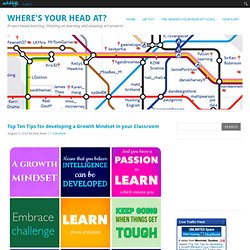
Students should expect and welcome criticism. They must also be given the opportunity to act on any criticism or critique. Learning-give-up.gif (GIF Image, 358 × 484 pixels) Growth Mindset Framing Tool. Developing Growth Mindset. Developing a Growth Mindset in Teachers and Staff. The New Psychology of Success (2000), Dweck developed a continuum upon which people can be placed, based upon their understandings about where ability comes from. For some people (at one end of said continuum), success (and failure) is based on innate ability (or the lack of it). Deck describes this as a fixed theory of intelligence, and argues that this gives rise to a ‘fixed mindset’. At the other end of the continuum are those people who believe success is based on a growth mindset.
These individuals argue that success is based on learning, persistence and hard work. Creating a Growth Mindset in Your Students. Belief that you can become smarter and more talented opens the doorways to success.
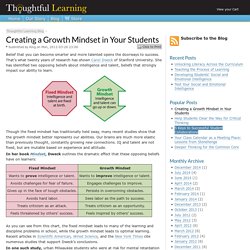
That’s what twenty years of research has shown Carol Dweck of Stanford University. She has identified two opposing beliefs about intelligence and talent, beliefs that strongly impact our ability to learn. Though the fixed mindset has traditionally held sway, many recent studies show that the growth mindset better represents our abilities. Our brains are much more elastic than previously thought, constantly growing new connections. IQ and talent are not fixed, but are mutable based on experience and attitude. In her book Mindset, Dweck outlines the dramatic effect that these opposing beliefs have on learners: Teaching strategies to create 'growth' mindsets. As a kid I wanted to become a cliché when I grew up so I bought a guitar and grew my hair.

I successfully learnt all the chords but struggled to combine them in a meaningful way (perhaps I should’ve joined an experimental jazz band instead of churning out 1980s power ballads). When my dreams of rock stardom eventually withered on the vine, I turned my attention to mastering magic, then to conquering chess, and to all manner of other hobbies. Developing a growth mindset. I’ve decided to use the spring break as an opportunity to catch up on some long overdue reading – starting with ‘Mindset’ by Carol Dweck.
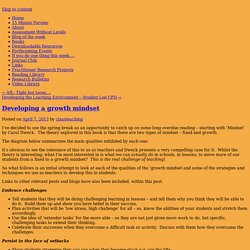
The theory explored in this book is that there are two types of mindset – fixed and growth. The diagram below summarises the main qualities exhibited by each one: It’s obvious to see the relevance of this to us as teachers and Dweck presents a very compelling case for it. Whilst the theory is interesting, what I’m most interested in is what we can actually do in schools, in lessons, to move more of our students from a fixed to a growth mindset? This is the real challenge of teaching! So what follows is an initial attempt to look at each of the qualities of the ‘growth mindset and some of the strategies and techniques we use as teachers to develop this in students.
Links to other relevant posts and blogs have also been included, within this post. Embrace challenges. Empowering Student Voice Through Classroom Culture. Posted 02/17/2015 12:31PM | Last Commented 02/22/2015 1:53AM Empowering student voice transforms a learner from being an observer to an initiator. We’ve all seen students who walk in the door on the first day of school with a fixed mindset.
Their previous educational experience may have led them to believe they may be great in math, but struggle in reading. These students come to us expecting to experience the same struggles and emotions they have in past years. Students may lack confidence, and be unwilling to take risks. Why the Growth Mindset is the Only Way to Learn. “You’re too old to learn a foreign language.” “I couldn’t work on computers.
I’m just not good with them.” “I’m not smart enough to run my own business.” Do you know what these statements have in common? They’re all examples of the fixed mindset- the belief that intelligence, ability, and success are static qualities that can’t be changed. Math = Love: Growth Mindset and SBG Bulletin Board Downloads. I already included the pictures of my two new bulletin boards this year in my massively long post of classroom pictures today, but I wanted to create a separate blog post that people could use to easily find the downloads to duplicate these bulletin boards in their own classrooms.
I don't think I've ever been this happy with my bulletin boards before. They make me smile. They represent what I think is important. They are useful to students. They spark conversations. Growth Mindset Maths - Growth Mindset Maths.